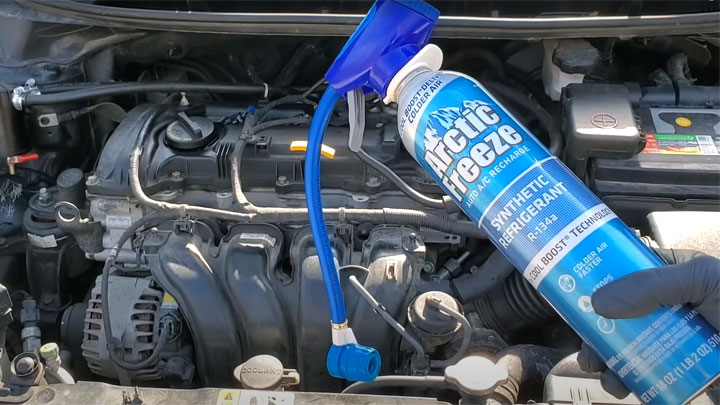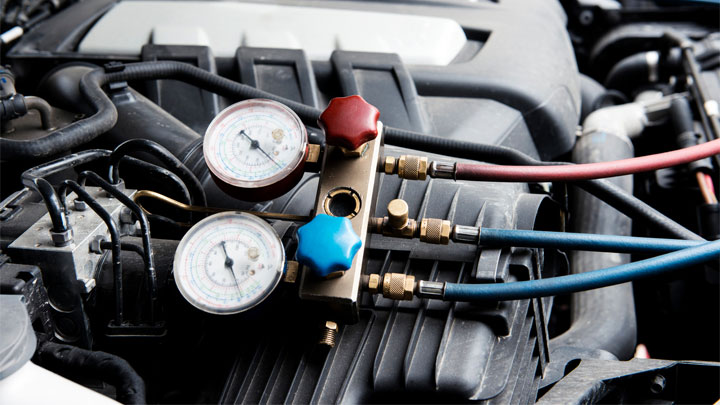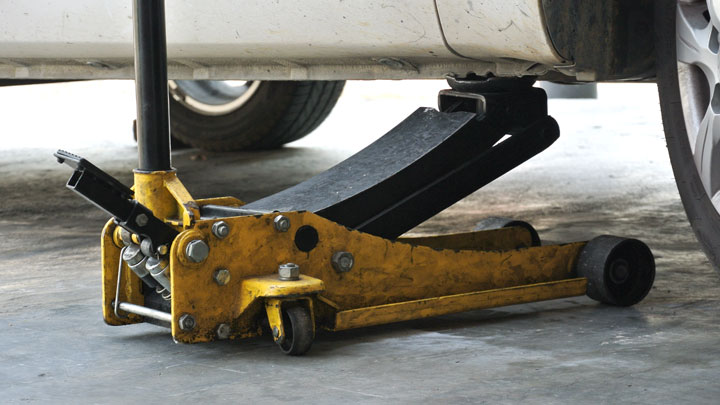Last Updated on November 14, 2022
There is little as welcome as the cool breeze of a vehicle’s air conditioning in the midst of summer’s swelter. After all, without such modern conveniences, our daily commute would be much less bearable, no matter its length. This notion, in itself, places increased importance on the state of our vehicle’s A/C system as a whole.
As most motorists are well aware, a vehicle’s A/C system must be adequately charged in order to achieve the highest degree of operational efficiency. For this reason, it is important to charge a vehicle’s A/C system periodically, especially if a leak of any severity exists within the system. Charging can be conducted using DIY kits or can be done by a professional.
However, many often find themselves wondering if their vehicle’s A/C system is overcharged, especially if they have topped the system off themselves. It is also natural to contemplate the results of such overcharging, as well as the symptoms that a condition of this type might present.
Read on to learn more about the various symptoms associated with an overcharged A/C system, as well as how to fix such an issue, should it arise in the future.
What Does an “Overcharged” A/C Mean?
Every A/C system ever assembled features a maximum charge rate, with those found in today’s vehicles being no different. This “maximum charge” details the full capacity of refrigerant that a particular system can accept.
Based on this knowledge, the idea of system overcharging is rather straightforward. An overcharged condition exists within an A/C system whenever an excessive amount of refrigerant has been introduced, generally equating to a total system charge exceeding that specified by the system’s manufacturer.
Whenever an A/C system is charged beyond its capacity, a number of troubling symptoms can arise, the bulk of which are detailed below. However, it suffices to say that an overcharged A/C system is largely incapable of operating at peak efficiency, much to the despair of any motorist reliant upon its functionality for comfort.
How Does It Happen?

A/C system overcharging commonly occurs whenever a vehicle’s owner attempts to charge the affected system themselves, using basic recharge kits that can be purchased from any auto parts store.
When using a kit of this nature, many find themselves limited in their ability to accurately gauge the amount of refrigerant that is being introduced. Furthermore, some kits come with little in the way of viable instructions.
Furthermore, most DIY A/C charging kits only come with a single pressure gauge, intended to display readings within a system’s low-pressure circuit. In this case, no high-pressure readings are obtained, thereby limiting one’s ability to fully observe a system’s response to charging their charging efforts.
More often than not, a motorist is unaware that they have overcharged their vehicle’s A/C system until undesirable cooling is noticed. Additionally, a number of additional symptoms can arise as well, leading one to further question whether or not they have overcharged the system as a whole.
See Also: Does Car Air Conditioning Use Gas or Electricity?
Overcharged A/C Symptoms
The presence of too much freon within a vehicle’s A/C system is often accompanied by a host of secondary symptoms. Recognizing these symptoms can prove valuable when attempting to quickly remedy the situation at hand.
The following are several of the most common symptoms associated with A/C system overcharging.
#1 – Warm Discharge Air

An overcharged A/C system seldom cools as it should, often discharging lukewarm air from the system’s vents. If you have recently had your vehicle’s refrigerant topped off, yet are not getting any relief from the heat, refrigerant overcharging could be to blame.
#2 – Odd Noises
If you have just had your vehicle’s air conditioning serviced, only to now notice strange sounds coming from beneath the vehicle’s hood, it might be a good idea to have the system’s refrigerant charge checked once more.
System overcharging can cause an A/C compressor to struggle often causing an audible gurgling or whining sound.
#3 – Irregular Pressures
Overcharging of an A/C system often causes high-side system pressures to skyrocket. System overheating can also come as a result, adding further insult to injury and preventing any level of cooling from being achieved.
#4 – Freezing of Suction Line
Freezing of an A/C systems suction line can easily occur at the hands of slight overcharging. This takes place primarily when the heat load into the evaporator is rather minimal, and freezing system temperatures are achieved.
Read Also: 8 Reasons Your A/C Compressor Clutch Isn’t Engaging
What To Do

In any event, the issue of overcharging within a vehicle’s A/C system must be promptly attended to. A lack of response by a vehicle’s owner can quickly lead to severe, and irreversible component damage. This, in turn, can necessitate additional expenditure on a motorist’s behalf, in order to reestablish full system functionality.
In short, one must bleed their vehicle’s A/C system, to achieve the desired charge rate. Unfortunately, this will almost certainly require a trip to the local service center, as most do not have a refrigerant recovery machine available at home.
Venting refrigerant into the atmosphere is highly-illegal, as freon is recognized by the EPA as an environmental pollutant.
If you are unsure as to whether or not your vehicle’s A/C system has been overcharged, a trip to your local automotive service center is highly advised. It is much better to address the issue at hand in a timely manner than to suffer system failure as the result of complacency.
Can Overcharging Damage the A/C Compressor?
Overcharging a vehicle’s A/C system can prove detrimental, if not catastrophic for the system’s compressor. This stems from the fact that a compressor is subject to substantially increased loading under such conditions, thereby causing severe fatigue.
Additionally, extreme overcharge can lead to sumping of the compressor, which describes a condition in which liquid refrigerant enters the inlet side of a compressor, often with devastating consequences.
Significant damage to a vehicle’s A/C compressor not only requires replacement but often full-system overhaul as well. This is due to the high probability of system contamination as debris from a failed compressor is forced downstream. In any event, damage of this type is quite costly to remedy.



